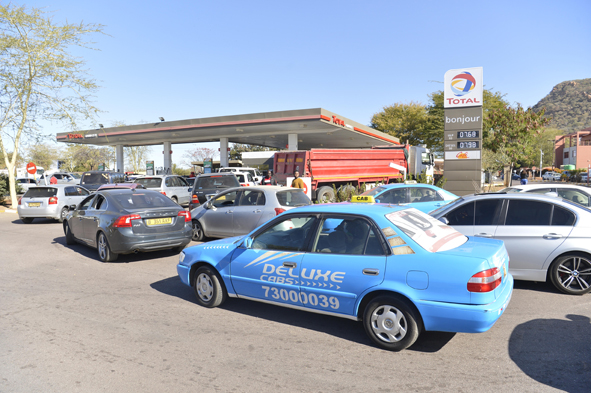COVID-19 cripples business sector
22 Dec 2020
The year 2020 has been the most difficult for the business sector due to the outbreak of COVID-19 which affected the world economy.
Businesses closed shops and retrenchments became the order of the day, affecting everyone from workers to their dependents.
Upon being hard hit by the pandemic, the sector was left grappling for survival with fear of the unknown sprouting within businesses, small and large.
The Setswana saying that Kgetsi ya tsie e kgonwa ke go tshwaraganelwa became apparent in unifying and building trust between government and the public to minimise the social and economic impact of the pandemic.
At least 63 per cent of half-year earnings of Botswana’s economic mainstay, Debswana got wiped off by the pandemic; with the economy contracting by an estimated 13.1 per cent in mining and production stooping 36 per cent lower at 7.5 million carats against the 2019 value of 11.7 million carats, according to information retrieved from Debswana website.
The alcohol industry, the largest employer and high-income generation business, also stood as one other industry that experienced unbearable outcomes with questionable and uncertain job security for the masses.
With no sales of alcohol for over three months and subsequent decline in sales, businesses trading in alcohol were left with nothing but to shutdown their premises and send employees home, however, government through Botswana Unified Revenue Service (BURS) cushioned the much-anticipated damage by introducing a wage subsidy which brought light and hope for survival during the era of closure.
The imposed lockdowns drastically reduced sales for many businesses which made future survival bleak, as the majority of businesses did not afford commercial spaces in designated malls and complexes.
However, government interventions were introduced which included among others support for home-based businesses as articulated by President Dr Mokgweetsi Masisi in the State-of-the-Nation Address (SONA) 2020.
Moreover, Botswana witnessed private and commercial banks coming on board to assist businesses heavily hit by the pandemic.
Among many interventions, the Citizen Entrepreneurial Development Agency (CEDA) was appreciated and recognised for the Letlhabile programme which issued no-interest loans to the informal sector during the difficult season.
With international travel ban during the first phase of the pandemic, a lot of businesses, especially retail and manufacturing businesses, proved unable to survive as sales inputs and raw materials could not be sourced to run at full operation.
Similarly, the tourism sector could not thrive and many businesses in this sector had to retrench with wage bills not being met as expected.
However, the government and banks devised plans to assist where possible hence the introduction of the moratorium and subsidies from Botswana Unified Revenue Services (BURS).
On issues surrounding tax avoidance, BURS, through section 36 of the Income Tax Act, audited motor vehicle dealerships to address all illicit behaviours designed to avoid tax which robs the country hefty amounts of tax monies due for collection. As a result, a couple of unscrupulous dealers were shut down during the exercise.
The unparalleled complications experienced by the fuel industry brought more disaster within the nation as fuel shortage became alarming within the country changing the way of life completely and disturbing trade patterns.
It was for this reason that the permanent secretary in the Ministry of Mineral Resources, Green Technology and Energy Security, Mr Mmetla Masire announced measures to rationally share the little available supply hence the introduction of Essential Supplies and Services (petroleum) Regulations, 2020, through which selling of fuel was capped at a maximum of P250 for one vehicle at a time.
Moreover, he added that filling stations were to operate between 6am and 8pm and the buying of petrol was limited to a maximum of 20 litres per person per day.
The agricultural sector, being the backbone and accustomed niche in the lives of Batswana, witnessed low harvests coupled with challenges emanating from the lockdown.
The government further introduced a farmer’s permit which meant farmers had time to visit their agricultural sites to avoid further loss.
Furthermore, the agricultural sector witnessed compassion and the zeal that President Dr Masisi had towards aiding farmers through the small-stock industry promotion initiative, where he donated rams and bucks to a wide range of local farmers across the country.
Moreover, as other means of empowering farmers, Botswana witnessed for the first time cabinet meetings being hosted at different farm sites across the country, something that Batswana highly cherished.
With a supplementary emphasis on citizen empowerment, Botswana Investment and Trade Centre (BITC), through its #PUSHA BW campaign, advocated and lobbied local produce and services to be absorbed within the market.
Likewise, BITC correspondingly hosted webinars to lure the interest of multi-national enterprises (MNEs) to invest in Botswana, and pressed to raise the country’s flag high despite European Union (EU) grey-listing issues that the country was implicated in.
This year also witnessed local authorities coming on board to assist Small Medium Enterprises (SMEs) to survive the harsh conditions brought by the pandemic.
It was against this background that the Local Enterprise Authority (LEA) and Statistics Botswana partnered to develop a SME register to assist locally-owned ventures to benefit from local procurement.
Meanwhile, as a way of redress and address the EU grey-listing, Botswana joined forces with the Financial Action Task Force to align its framework on the FATF assessment and the EU supported all efforts made by the government to address the deficiencies that had been identified.
With the aforementioned challenges and developments within Botswana’s business sector, writers and market economists predicted the full recovery of the country’s economy to bounce back two years from now.
Otherwise, the government in its many set interventions to aid local businesses and reduce the import bill, promised to be very helpful with positive advice to build back the sector. ends
Source : BOPA
Author : Marvin Motlhabane
Location : GABORONE
Event : 2020 Business recap
Date : 22 Dec 2020







